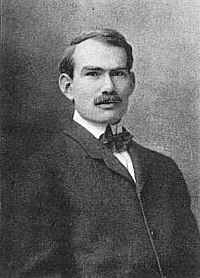Lee De Forest
American inventor (1873–1961)
Lee De Forest (August 26, 1873 – June 30, 1961) was an American inventor. One of the fathers of the electronic age, he is credited with fundamental contributions to radio and to sound in motion pictures.

Quotes
edit- So I repeat that while theoretically and technically television may be feasible, yet commercially and financially, I consider it an impossibility; a development of which we need not waste little time in dreaming.
- 1926, as quoted in Gawlinski, Mark (2003). Interactive television production. Focal Press. p. 89. ISBN 0-240-51679-6.
- The children of the white families in town were not permitted to associate with me, because my father was committing the then unpardonable crime, in Southern eyes, of educating negroes.
- Interviewed by Frank Parker Stockbridge, "The Man Who Made Radio Talk", Popular Science Monthly, May 1929
- Unwittingly then had I discovered an Invisible Empire of the Air, intangible, yet solid as granite, whose structure shall persist while man inhabits the planet.
- Father of Radio: The Autobiography of Lee De Forest (1950), p. 4
- The actual poetry of this engineering triumph was first brought stunningly upon me in 1915 when I sat in an audience in San Francisco and heard the breaking of the surf upon the far Atlantic shore.
- "Dawn of the Electronic Age", Popular Mechanics, January 1952
- The microphone-amplifier-loudspeaker combination is having an enormous effect on our civilization. Not all of it is good! Consider to what heights of impudence and tyranny, and to what depths of moral depravity, has radio broadcasting and the loudspeaker attained in that recent monstrosity, Transit Radio, Inc. Almost incredible is the loathsome fact that already in 21 cities bus riders must listen to never-ending, blatant advertising and unwelcome jitterbug and bop music.
- "Dawn of the Electronic Age", Popular Mechanics, January 1952
- I foresee great refinements in the field of short-pulse microwave signaling, whereby several simultaneous programs may occupy the same channel, in sequence, with incredibly swift electronic communication; vastly important developments in microwave technique, whereby present clumsy connecting leads between wall or floor sockets and electric devices like toasters and vacuum sweepers may become unnecessary; gigantic magnetrons and klystrons, or their successors, will generate megawatts in microwaves; living rooms and their occupants will be heated by high-frequency waves from walls or ceilings; short waves will be generally used in the kitchen for roasting and baking, almost instantaneously
- "Dawn of the Electronic Age", Popular Mechanics, January 1952
- To place a man in a multi-stage rocket and project him into the controlling gravitational field of the moon where the passengers can make scientific observations, perhaps land alive, and then return to earth—all that constitutes a wild dream worthy of Jules Verne. I am bold enough to say that such a man-made voyage will never occur regardless of all future advances.
- De Forest Says Space Travel Is Impossible, Lewiston Morning Tribune via Associated Press, February 25, 1957
External links
edit- Encyclopedic article on Lee De Forest on Wikipedia
- Media related to Lee De Forest on Wikimedia Commons
- Works related to Author: Lee de Forest on Wikisource